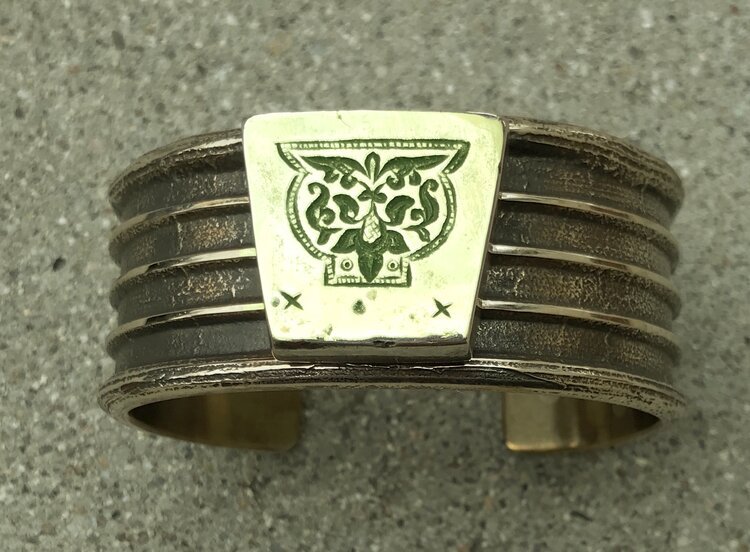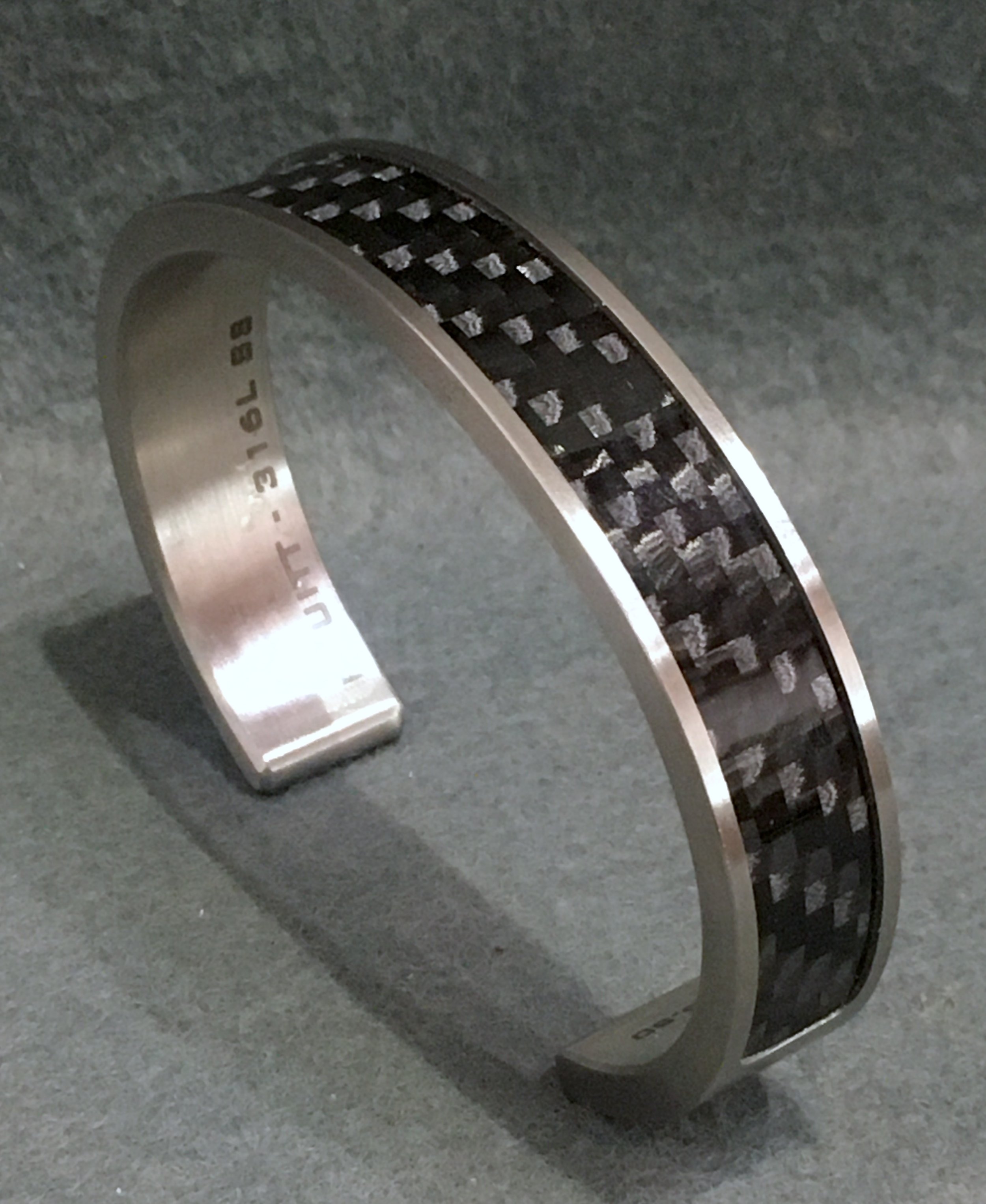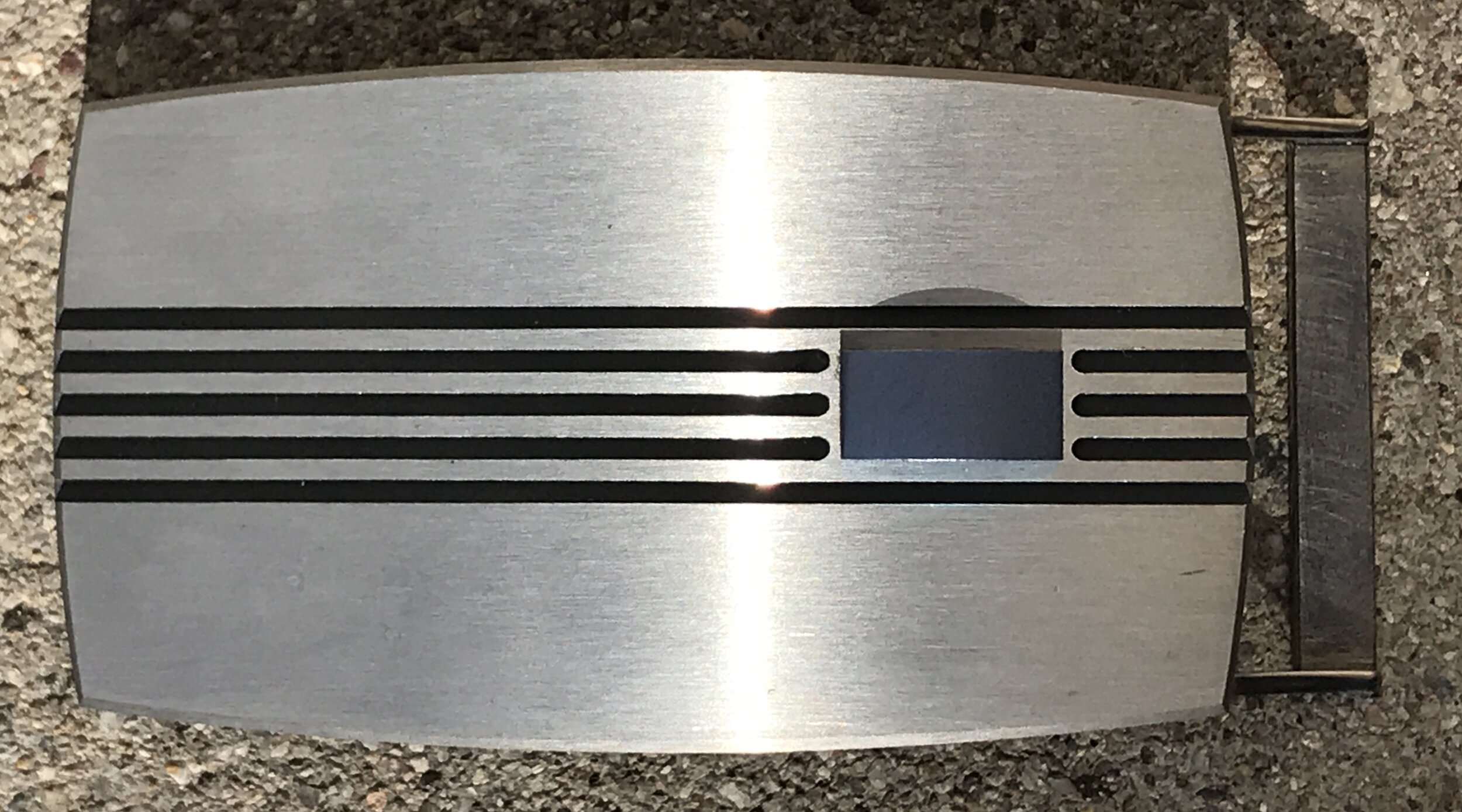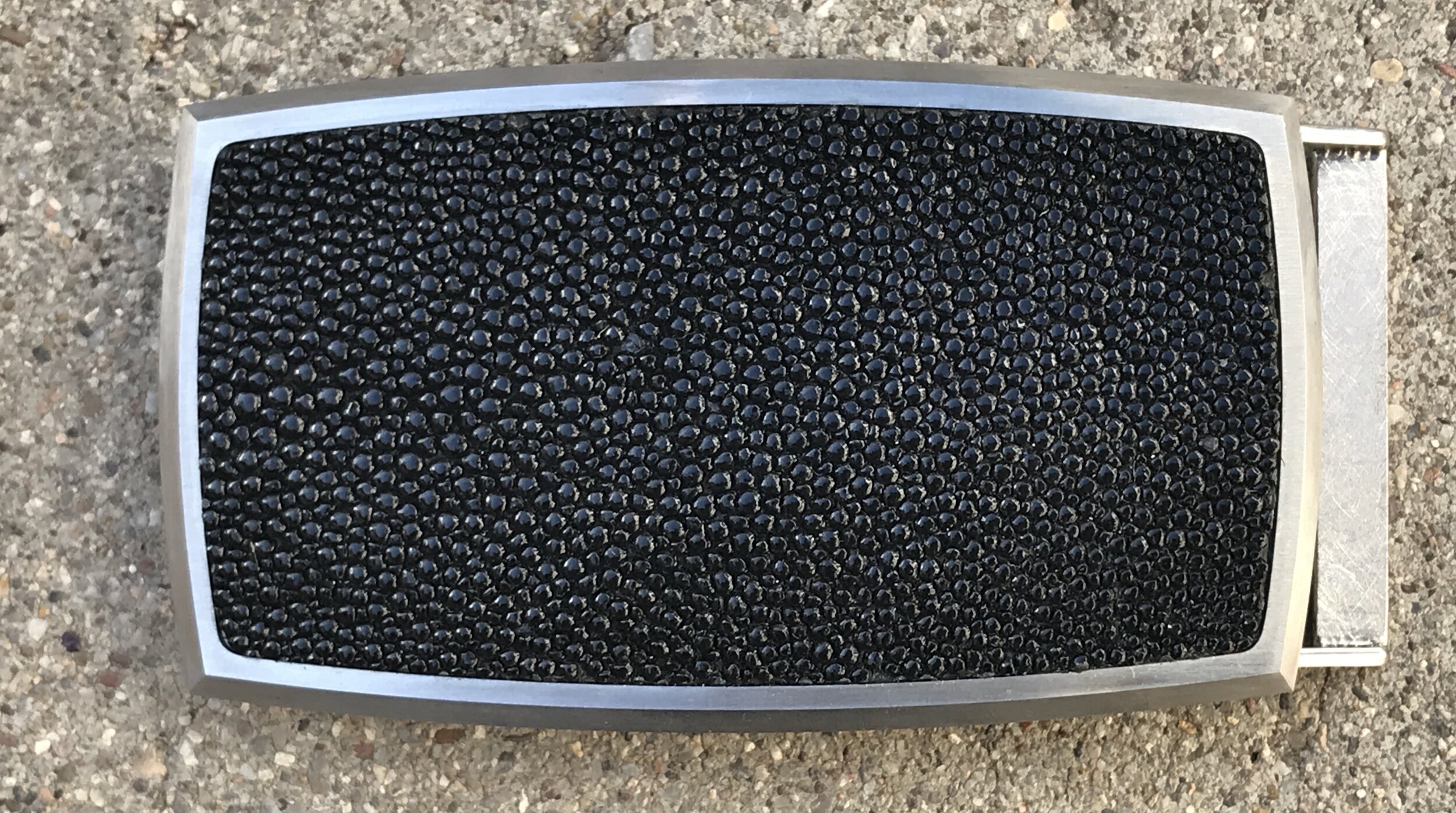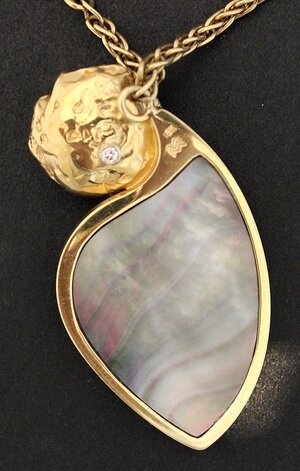Raymond Sequaptewa is hands down one of the the most imaginative silversmiths out there. As such, no one has even really tried to imitate his eclectic style.
Strung on a 21 inch long stand of abalone shell beads with a single coral bead for accent, the pendant measures 1.75 by 2.5 inches. $4500 (TUCSON)
Signed Marie + Julian. The cloud and bird motifs were painted by Julian (also known as Pocano, 1879–1943) 5 by 6.5 inches. $5500 (TUCSON)
The Late Harvey Begay worked mostly in the lost wax casting technique, so this tufa cast bracelet is quite unusual. 1 inch wide for a medium wrist. $675 (TUCSON)
A Germantown runner. 24 by 44 inches. Very good condition. Circa 1920. $1878. (TUCSON)
Circa 1880, this Chief’s blanket pattern textile was woven of natural grey wool, aniline dye red and indigo blue. It measures 53 by 35 inches. Very good condition with minimal restoration. More details and important close-ups in our Vintage Weavings Gallery. (TUCSON) $22,000.
Three pieces by Quaid Shorty, son of famed jeweler Perry Shorty, Like his father, most of his jewelry is made from coin silver, hand hammered out in the old technique. The first bracelet, in an 1880s style, is 3/8 inch wide and made for a medium wrist. $1200. Next is another old style bracelet, this one set with natural turquoise from the #8 Mine in Nevada. 7/8 inch wide and made for a medium-large wrist, $1275. The ring is set with natural turquoise from Nevada and is a size 7 1/2. One inch long. $650.
Pieces that were a collaboration between Maria and her son Popovi Da are highly sought after. This beautifully executed vase is one such piece. Made April of 1963 as inscribed, it is 6.5 by 6.5 inches. $4800. (TUCSON)
The Patania Family - the only family of metalsmiths to have their work included in the Smithsonian Museum (in the Renwick Gallery).
listen to their story here: https://www.youtube.com/watch?v=2xgcWwiixpY
Frank Patania Sr came to this country with his widowed mother in 1908, fleeing the devastation of an earthquake in Messina, Sicily, where he had been apprenticed at age 6 to a goldsmith. While in New York he contracted TB and was sent to Santa Fe in 1924 to recover. By 1927 he was well enough to open his own silversmith shop in Santa Fe (and in Tucson in 1937) with his brother Carmelo “Pat” where he forged a new design aesthetic that reverberates to this day - a unique blend of Old World metalworking and the influence of the Southwest. Over the years many American Indian jewelers have apprenticed with the Patania family.
Frank Jr (b 1932) began working full-time as a silversmith in his father’s shop in 1956. Over time he made his mark creating very modern pieces, including liturgical work – some of it monumental in size. His son Sam, the third generation, is forging into yet new territory, inspired by the work of the previous two generations but reflecting his own artistic vision. Joining them is the newest Patania apprentice: 4th generation Marco.
This ring (a size 7 1/4) was set with natural turquoise from the Burnham/Godber’s Mine. SOLD
A 18k gold hand-wrought bracelet by Frank Patania Jr. 1/2 inch wide, measuring 5.25 inches with a 1+ inch opening. Accented with white gold drops. $2650. (TUCSON)
Frank used a brass jewelry die from India and mounted it on one of his cast jeweler’s bronze bracelets to create this unique piece. 5.5 inches with a 1 inch opening and measure 1 inch wide. $400. (TUCSON)
A sterling cross with a deep red Mediterranean coral set in 14 kt gold. $600. (TUCSON)
The beautiful silver box was made by Frank Patania Jr. This one dates November 8, 1968. It measures 4 inches by 3 inches and is 3/4 of an inch deep. $2400. (TUCSON)
#15 in an edition of 100, this Georgia cuff was made by Sam Patania following the original design of his grandfather. 1.5 inches wide and made for a medium-small wrist. $800. (SANTA FE)
This sterling ring has a very fine natural spiderweb turquoise. It is a toss-up whether it’s from the Lone Mountain Mine or the #8. Just over 1/2 inch wide, the shank is what Frank calls a ‘comfort shank’ - a shape that will comfortably fit (in this case) anything from a size 8 to a size 9. $675. (TUCSON)
Left to right: The first cuff is a laser cut titanium with an A-I-R cloud motif. This one is a size 6 and $650. (SANTA FE) Next is a lightning and cloud motif laser engraved onto stainless steel. Size 6.5 and $750. (TUCSON) Third in the row is a titanium and zirconium damascus bracelet, size 6.5 and $850. (TUCSON) Last in the row is a stainless steel with a timing belt inlaid, a size 6 and $450. (SANTA FE)
All sizes are indicated by Pat on the interior of his pieces.
In the two photos at left are two beautifully executed Zirconium bracelets. They are both a size 5.5, with openings of 1.25 inches. Each $800. The third one in the row is a stainless steel bracelet with carbon fiber inlay. Size 6.5 and $450. Last but not least is a 1/4" square Zirconium bracelet with laser work. Size 5.5 and $850. (ALL in SANTA FE)
From left to right: a stainless steel bracelet with stingray leather, size 5.25 with a 1 inch opening. $450. Next is another stainless steel cuff, this one has a piece of shark leather with a laser cut star motif. Size 5.5 and SOLD. The last one in the row is a stainless steel cuff with shark leather. A size 5 with a 1.25 inch opening. (All in SANTA FE)
The first bracelet is made from stainless steel and is a design collaboration with the beadwork artist, Jamie Okuma. 1.25 inches wide and made for a medium-large ladies wrist. 5.75 and 1.25. Next is a stainless steel bracelet with laser engraving. This one is 5.75 inches with a 1.25 inch opening. (Both in TUCSON)
Buckles by Pat in stainless steel, each is made for a 1 1/2 inch belt and measures 3.5 by 2.5 inchesThis stainless steel buckle above left is set with a piece of niobium. $1750. The next buckle is inlaid with stingray skin and is $700.
The one below left is titanium with an anodized edge. $850 Next to it is an elegantly textured zirconium. zirconium version. $850. (ALL IN TUCSON)
Any of these would be a stunning addition to a man’s wardrobe.
(not too late to be thinking about Father’s Day - or any other special occasion)
A titanium ranger buckle, made for a 1 inch belt. $2400. (TUCSON)
These titanium earrings - Raven Claw- are a collaboration between Pruitt and Crystal Kaakeeyáa (Tlingit and Deg Hit’an Athabascan from Alaska) Each size and style is available n several different finishes. We would be happy to send photos of those if you ask. From left to right: 2.75 inches long and $150. 4.75 inches long and $300 4.5 inches long and $250. TUCSON)
Work by the legendary Hopi artist Charles Loloma (1921-1991), who opened the door to amazing innovation in American Indian jewelry beginning in the early 1960s. A ceramicist by training (he and his wife, Otellie, earned a degree in ceramics from Alfred University's School for American Craftsmen in 1949) He and my father met in the mid 1950s and became lifetime friends and I spent the summer with Charles at his tiny studio outside the village of Hotvela when I was 15, but it is far more than personal friendship and regard that makes me say that Charles was one of the seminal jewelers of the second half of the 20th century.
Please note that there are counterfeits of Loloma's work out there. We provide written documentation on each piece, including the prior owner - with the original owner’s signature where possible.
At left: From the collection of a musician and record shop owner in Tucson who acquired it from Charles in the very early 1960s. Unsigned but full documentation authenticating it is available. It was hammered from behind to provide dimensionality. 3.25 by 1 1/8 inches and made for a 3/4 to 7/8 inch belt. $8500.
At right, another very early Loloma tufa cast buckle. 1 by 2.75 inches and made for a 3/4 inch belt. $4500, Also unsigned but full documentation available. (TUCSON)














